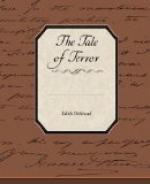“The two mock novels, Azemia and The Elegant Enthusiast, were written to ridicule the novels written by his sister, Mrs. Harvey (I think), who read these parodies on herself quite innocently.”
Even in the gloomy regions of Eblis, Beckford will not wholly repress his sense of the ridiculous. Carathis, unawed by the effulgence of his infernal majesty, behaves like a buffoon, shouting at the Dives and actually attempting to thrust a Soliman from his throne, before she is finally whirled away with her heart aflame. The calm politeness with which the dastardly Barkiaroukh consents to a blood-curdling murder, the sardonic dialogue between Vathek on the edge of the precipice and the Giaour concealed in the abyss, the buoyantly high-spirited description of the plump Indian kicked and pursued like “an invulnerable football,” the oppressive horror of the subterranean recesses, the mischievous pleasantry of the Gulchenrouz idyll reveal different facets of Beckford’s ever-varying temper. In Vathek, Beckford found expression not only for his devotion to the Eastern outlook on life, but also for his own strangely coloured, vehement personality. The interpreter walks ever at our elbow whispering into our ear his human commentary on Vathek’s astounding adventures.
Beckford’s pictures are remarkable for definite precision of outline. There are no vague hints and suggestions, no lurking shadows concealing untold horrors. The quaint dwarfs perched on Vathek’s shoulders, the children chasing blue butterflies, Nouronihar and her maidens on tiptoe, with their hair floating in the breeze, stand out in clear relief, as if painted on a fresco. The imagery is so lucid that we are able to follow with effortless pleasure the intricate windings of a plot which at Beckford’s whim twists and turns through scenes of wonderful variety. Amid his wild, erratic excursions he never loses sight of the end in view; the story, with all its vagaries, is perfectly coherent. This we should expect from one who “loved to bark a tough understanding."[72] It is the intellectual strength and exuberant vitality behind Beckford’s Oriental scenes that lend them distinction and power.
The History of the Caliph Vathek did not set a fashion. It is true that the Orient sometimes formed the setting of nineteenth century novels, as in Disraeli’s Alvoy (1833), where for a brief moment, when the hero’s torch is extinguished by bats on his entry into subterranean portals, we find ourselves in the abode of wonder and terror; but not till Meredith’s Shaving of Shagpal (1856) do we meet again Beckford’s kinship with the East, and his gift for fantastic burlesque.




